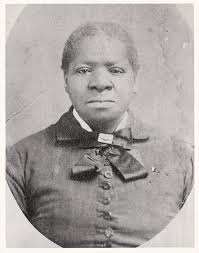Biddy Bridget Mason: From Enslaved to Entrepreneur

Biddy Bridget Mason (1815–1891) was an extraordinary woman who rose from a life of slavery to become one of the first Black women to own property in Los Angeles.
Her story is one of resilience, courage, and generosity, inspiring generations long after her passing.
Born into Slavery
Biddy Mason was born into slavery in 1815 in Georgia. Her early life was marked by hardship and servitude. At the age of 18, she was “given” as a wedding gift to Robert and Rebecca Smith, a Mormon couple in Mississippi. This marked the beginning of a challenging journey across the United States.
A Grueling Journey to Utah
In 1847, at the age of 32, Biddy was forced to walk 1,618 miles from Mississippi to Utah. She tended cattle along the way, following her master’s caravan of 300 wagons. This trek was physically exhausting and emotionally taxing, but it showcased her incredible endurance.
The Smith family settled in Salt Lake City, Utah, but their stay there was short-lived. In 1851, they joined a group of settlers moving to San Bernardino, California, in search of gold. This move would change the course of Biddy’s life.
Discovering Freedom in California
California had been admitted as a free state in 1850, making slavery illegal. However, Robert Smith attempted to bypass this law. He planned to take his slaves, including Biddy and her three daughters, to Texas, where slavery was still permitted.
Biddy learned about her rights with the help of freed Black residents she met in California. With their support, she attempted to escape to Los Angeles. Unfortunately, the Smith family intercepted her and the other slaves before they could reach safety.
Fighting for Her Freedom
When Robert Smith tried to leave California with his slaves, a local posse intervened and prevented him from leaving. With courage and determination, Biddy took legal action. She filed a writ of habeas corpus, bringing Smith to court to challenge her unlawful captivity.
The court held Biddy and the other slaves in protective custody to shield them from pro-slavery mobs. After a tense legal battle, the judge ruled in favor of Biddy and granted freedom to her, her three daughters, and ten others on January 19, 1856.
Building a New Life in Los Angeles
As a free woman, Biddy moved to Los Angeles with her daughters. She worked tirelessly as a nurse, midwife, and domestic servant. Her hard work paid off, and she eventually saved enough money to buy her first property at 331 Spring Street in downtown Los Angeles.
Biddy became one of the first Black women to own land in Los Angeles. She made the most of her investment by using part of her land as a resting place for horses and carriages. Visitors to the city paid to park their carriages there, making it Los Angeles’s first “parking lot.”
A Generous Spirit
Biddy Mason never forgot her struggles and was always willing to help others. She opened her home to the poor, hungry, and homeless, offering food, shelter, and comfort. Her kindness extended beyond individuals—she invested her growing wealth in schools, hospitals, and churches to uplift her community.
Biddy’s financial acumen allowed her to purchase more land and establish a commercial building. Over time, her real estate investments grew, and she amassed a fortune of nearly $300,000, equivalent to about $6 million today.
Founding the First AME Church
One of Biddy Mason’s most notable accomplishments was founding the First African Methodist Episcopal (AME) Church in Los Angeles. This church became a cornerstone for the Black community and a symbol of hope and unity.
Biddy believed in the power of giving. She often said, “If you hold your hand closed, nothing good can come in. The open hand gives in abundance; even as it receives.” Her philosophy of generosity guided her throughout her life.
A Legacy of Inspiration
Biddy Mason passed away on January 15, 1891, at the age of 76. Her life was celebrated for her incredible contributions to her community and her trailblazing spirit.
Nearly a century later, on March 27, 1988, a special ceremony was held in her honor at the First AME Church, which she helped establish. Los Angeles Mayor Tom Bradley and other dignitaries attended the event, recognizing her lasting impact on the city and beyond.
Remembering a Pioneer
Biddy Bridget Mason’s life is a testament to resilience, courage, and compassion. From a slave forced to walk over a thousand miles to a wealthy landowner and community leader, her journey inspires us to fight for justice and uplift those around us.
Her legacy reminds us of the power of perseverance and the importance of giving back. Indeed, Biddy Mason is a name that will forever stand as a symbol of hope and strength.
FAQ: Biddy Bridget Mason
1. Who was Biddy Bridget Mason?
Biddy Bridget Mason was a formerly enslaved woman who became one of the first Black women to own property in Los Angeles. She is remembered for her philanthropy, financial success, and community contributions.
2. Where was Biddy Mason born?
Biddy Mason was born into slavery in Georgia in 1815.
3. How did Biddy Mason gain her freedom?
Biddy Mason filed a legal case in California when her master attempted to relocate her to Texas to avoid freeing her. In 1856, the court granted her freedom along with her daughters and ten other enslaved individuals.
4. What did Biddy Mason do after gaining her freedom?
After gaining her freedom, Biddy worked as a nurse, midwife, and domestic servant. She saved money to buy land in Los Angeles, eventually becoming a wealthy real estate investor and philanthropist.
5. What is Biddy Mason best known for?
She is best known for her generosity, founding the First African Methodist Episcopal (AME) Church in Los Angeles, and being one of the first Black women to own property in the city.
6. How much wealth did Biddy Mason accumulate?
Through smart real estate investments, Biddy Mason amassed a fortune of $300,000, equivalent to around $6 million today.
7. What challenges did Biddy Mason face during her life?
Biddy faced numerous challenges, including being born into slavery, enduring a 1,600-mile forced walk to Utah, and fighting legal battles for her freedom in a hostile environment.
8. What was Biddy Mason’s contribution to Los Angeles?
Biddy donated to schools, hospitals, and churches and opened her home to the poor and homeless. She also established the First AME Church in Los Angeles, which became a vital community center.
9. What did Biddy Mason believe in?
Biddy believed in generosity and helping others. She often said, “If you hold your hand closed, nothing good can come in. The open hand gives in abundance; even as it receives.”
10. How is Biddy Mason remembered today?
Biddy Mason is remembered as a trailblazer for her contributions to civil rights, her philanthropy, and her success as a Black woman during a time of great adversity. A ceremony was held in her honor in 1988 at the First AME Church she helped establish.

